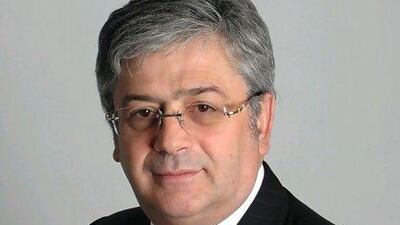Eurasian Natural Resources Corporation (ENRC) emerged out of the post-Soviet privatisation process in Kazakhstan in the 1990s.
It was floated on the London Stock Exchange in 2007, where it is a member of the FTSE index with a market capitalisation of nearly £6 billion (Dh34.89bn). However, it is still majority owned by shareholders in Kazakhstan.
Last year, ENRC provoked controversy in London when two non-executive directors resigned after boardroom disagreements, with one of them commenting that the way the company was run was "more Soviet than City".
Here, Felix Vulis, the long-standing chief executive, gives his view of the company as a major Kazakh corporation and as a member of one of the big international exchanges.
Can you explain the significance of ENRC to the economy of Kazakhstan?
ENRC is one of the largest companies in Kazakhstan, with revenue of US$7.7bn (Dh28.28bn) and earnings of $3.5bn. We account for approximately 4 per cent of Kazakhstan's GDP and employ over 65,000 in the country. ENRC is a business with tremendous assets and an established track record, and it is our assets in Kazakhstan, which are world class, that form the bedrock of our international expansion programme.
Just to highlight a few points, ENRC is now one of the world's largest producers of ferrochrome, one of the world's significant exporters of iron ore, the world's ninth-largest producer of traded alumina, and one of the largest electricity providers in Kazakhstan, accounting for over 16 per cent of the country's recorded electricity production in 2011.
We aim to grow our business while maintaining our commitment to respecting the environment, providing safe and healthy workplaces and making a positive contribution to the societies in which we operate. Alongside our significant investment in infrastructure, energy supply and the modernisation of our extensive operations, we support the communities in which we operate.
As part of our well established CSR [corporate social responsibility] programme, last year ENRC funded projects totalling over $100 million, which specifically supported education, health care, housing and cultural initiatives.
You chose the London Stock Exchange as the location for your market listing. Why was this? Were there other viable alternatives?
The London Stock Exchange was a natural choice for us. It is one of the most respected exchanges in the world. It is also the home of a large number of our mining peers and hence provides us with a pool of informed investors.
What are the challenges for a Kazakh company in dealing with international investors?
The challenges for a Kazakh company are no different to other companies who are seeking international investment - showing that you have a world-class business and management team and consistently communicating our strategy, which is to deliver long-term investment returns. I would see it not so much as a challenge as an opportunity as international investors tend to inherently understand the international nature of our business.
What's your take on the current state of the Kazakh economy?
The Kazakhstan economy has undergone significant development of late. In the last year it showed relatively strong economic growth [7.5 per cent GDP growth against 7.3 per cent in 2010], primarily driven by growth in the services sector, communications, domestic trade, agriculture and manufacturing.
The local currency, the Kazakh tenge, appreciated modestly against the dollar. It is expected that the high global oil prices and investment into energy will help to sustain the strength of tenge. We have great confidence in the future prosperity of the Kazakh economy, demonstrated by our extensive investment programme. To highlight two examples, earlier this year we acquired the remaining shares we did not already own in a high-quality coal asset, Shubarkol, and next year we are due to complete one of ENRC's key investment projects, the $750m construction of the new Aktobe ferroalloys plant, which will be one of the largest and most modern high-carbon ferrochrome plants in the country.
What's your view on the global commodities market? Are we in a "bubble" phase?
The global commodities market has been strong for a number of years. However, against a turbulent economic backdrop, the commodity pricing environment has been volatile. In the longer term, our confidence in the commodities market remains strong.
As a global corporation, how do you view the Middle East?
While we currently have no operations in the Gulf, we are very aware that it has been one of the most successful regions in the global economy in recent years and remains one of the most important energy markets in the world. In particular, we have noticed the increasing commercial links between the UAE and Kazakhstan, which can only be a good thing for a developing economy.

